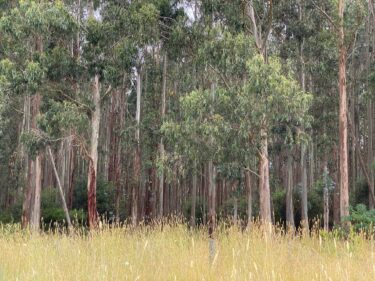The Carbon Market Institute’s webinar series – Carbon Conversations – always provides some good insights into what’s happening in the carbon market and last week’s ‘Unpacking the Chubb Review and potential ACCU framework changes’ was no exception.
An interesting and informative Panel of guests as usual, but this was unique in that there was a rare appearance from Professor Ian Chubb – the man who Chaired the highly anticipated review into the governments carbon credit scheme – the ‘Independent Review of Australian Carbon Credit Units (ACCUs)’ now affectionately known as the Chubb Review.
With so many opinions and a lot of noise in the media and industry about this review, it was insightful to hear from the man himself on what the process looked like from the review Panel’s perspective – and to understand more broadly what the thinking was behind the process, the aims and the Panel’s recommendations.
Here’s a quick rundown and highlights of what Professor Chubb discussed.
The big picture
This review was a very important element in Australia’s strategy to reduce emissions and combat the negative impacts of climate change. This is not a magic bullet – but this forms part of the strategy to help Australia transition.
Ultimately, we need to not only reduce emissions but get to net negative. Photosynthesis is the one piece of ‘tech’ that we currently have that we know works and that we can use to draw down carbon emissions and grow at scale.
“It’s about time Australia stops throwing out the good because it isn’t perfect. And that we that we take what is good and improve it from the learnings we can get from its use, and the further development that we can make as we set it up, as we believe we did, for the future, which will give us confidence that the scheme is delivering what it purports to deliver.” Professor Chubb
Which ultimately is its function – as an effective carbon drawdown scheme.
Panel background, goal and mindset
The Panel was made up of four members deliberately chosen, two with deep subject matter expertise of carbon and carbon sequestration projects and markets and two to provide an outside perspective with the role to interrogate. The Panel was supported by a further secretariat of four with very deep knowledge and experience, totally committed to the task and providing oversite to ensure errors were not made.
The Panel had a single-minded focus to improve ‘what is a good scheme’.
“We know that any scheme designed and used by human beings can be improved with time and experience. A lot has been learnt in the since the first steps 10 years ago and it was in the spirit of continuous improvement, that we wrote various ways that we saw and we were advised and we noted that advice, that told us we could improve the scheme in particular ways and these are the recommendations of the report.” Professor Chubb
The Panels’ goal was to ensure the recommendations were practical, balanced and sensible.
On the review process
It was a very time consuming and very intense project. No one expected the level of time and analysis that would be involved.
A lot of input was received. Every piece of input, advice and feedback the team received throughout the consultation process was thoroughly considered and contextualised. Whether from those critical, or those supportive of the scheme.
The Panel’s view was that all of the feedback was useful and was considered.
“I can assure you that every single piece of input that we got was carefully considered and it was contextualised with the rest… We passed every single word – several times.” Professor Chubb
The information was pored over time and time again and the Panel went ‘over it and over it and over it and under it and around again and again’ to review and understand the information and to make sure what they were advising was practical, balanced, sensible, wouldn’t surprise too many people who actually want something that works.
No specific feedback had more weight, and every bit of advice was considered and were viewed seriously, and looked at consistently, frequently and equally.
The report and recommendations were written in plain English in a way meant to be understood without reading between the lines, by people who would use it and see why it is an improvement on the present scheme.
In the spirit of and with a goal of continuous improvement, the Panel came to their 16 recommendations which we reviewed in ‘The Chubb Review: Exploring the recommendations for Australia’s carbon market from experts working in the field’.
What recommendations did Professor Chubb highlight as key?
- Increased transparency. Majority of input talked about lack of transparency. Currently third parties don’t have the data they need to understand, review and critique. Carbon estimation is key. This is critically important. The whole process and open transparent data should be default.
- We propose a proponent led method development process. To accommodate differences between regions and potential to innovate. This would be tailored to regions and landholders and needs to be flexible to be effective and allow landholders to be adaptable and innovate from the outside.
- Enhance and clarify governance. Blurring of the Emissions Reduction and Assurance Committee and the Regulator has led to confusion – whether real or perceived. The Panel has recommended the establishment of a Carbon Abatement Integrity Committee with the capacity and expertise to ensure we have confidence from the inside and outside with data transparently available.
The emerging importance of co-benefits
Co-benefits are key factor in ERF projects and the Panel’s view is that when a project is put forward, the Proponent should be asked to indicate what sort of co-benefits they think should flow through into communities. This is not mandatory – but there is the expectation that if it is possible, this should be explored as communities should conceive a benefit flowing to them. For two main reasons
1. communities support for the scheme will make the scheme better
2. evidence emerging that prices for ACCUs generating tangible co- benefits are higher vale
“A significant effort should be made to provide more opportunities for First Nations expert advice and project participation than there presently is, based on the way the scheme is structured.” Professor Chubb
The outcome
The Panel concluded the scheme was basically sound and, in their recommendations, strove to strike a balance in learning from the good work being done, to building on it and getting better as we learn and continuously improve as we go.
“We think the recommendations provide what is necessary to ensure the integrity of the scheme. That it is maintained and enhanced and importantly, in the context of the need to pull down carbon from the atmosphere, and the fact that photosynthesis is the one technology and bit of science that that we have now that we can deploy at scale, the scheme is able to grow.” Professor Chubb
“We (the Panel) are proud of it (the report) and we believe it sets scheme up well for the future”.
Need guidance on carbon market projects or the scheme?
We are established carbon market advisors and can provide guidance on carbon abatement estimates and eligibility due diligence, economic analysis, project implementation and other strategic advisory support. Reach out to our team for advice on building an offsets strategy or eligibility of a property for implementing a carbon project: Call +61 3 7035 1740. If you need advice on a wider climate change or sustainability strategy, we can help with that too.

